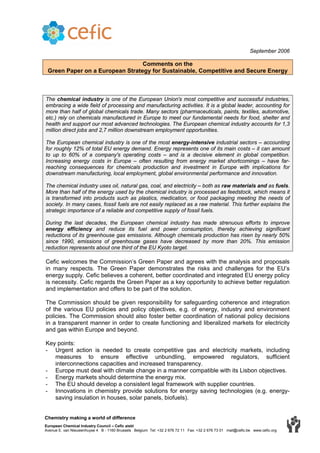The document summarizes the key points from a response by Cefic (European Chemical Industry Council) to the EU's Green Paper on energy policy. The summary includes:
1) Cefic believes the EU needs to create truly competitive gas and electricity markets through measures like effective unbundling of suppliers, empowered regulators, increased transmission capacity, and transparency.
2) Security of supply depends on open markets that attract investment. Transparency of supply and demand data is also important.
3) The energy mix should be determined by the market, not policies that exclude options like nuclear. Renewables should focus on cost-effective technologies.







